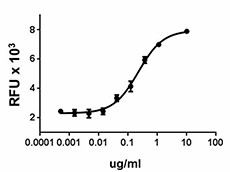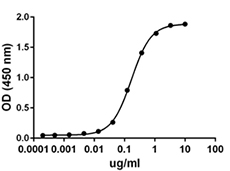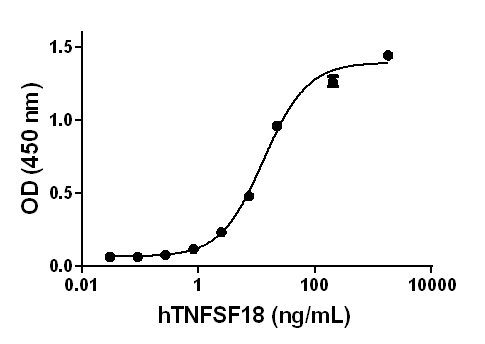- Regulatory Status
- RUO
- Other Names
- Activation-inducible TNF receptor (AITR) ligand (AITRL), GITR ligand, GITRL
- Ave. Rating
- Submit a Review
- Product Citations
- publications

-

Immobilized mouse TNFSF18 and anti-mouse CD3 induce splenocytes proliferation. -
Stability testing for Mouse TNFSF18: Mouse TNFSF18 was aliquoted in PBS, pH 7 at 0.2 mg/ml and was treated as follows: one aliquot was kept at 4⁰C (control), another was freeze/thawed four times (4x freeze/thaws), one incubated for seven days at room temperature (RT) and another incubated at 37⁰C for one week. After this procedure, the samples were tested for their ability to induce splenocytes proliferation when anti-CD3 (200 ng/ml, Cat. No. 100207) and TNFSF18 are immobilized.
| Cat # | Size | Price | Quantity Check Availability | Save | ||
|---|---|---|---|---|---|---|
| 752602 | 10 µg | 118€ | ||||
| 752604 | 25 µg | 221€ | ||||
The mouse TNFSF18 (GITRL) ligand was initially cloned from mouse endolthelioma cells. It is a type II membrane protein consisting of 173 amino acids and is 51% identical to the human protein. In contrast to the homotrimeric structure of the TNF family members, the mouse GITRL crystal structure reveals a dimeric assembly. GITR is a costimulatory molecule and is a member of the TNF growth factor receptor family, which includes CD40, CD27, 4-1BB, and OX40. GITRL is induced on murine splenic B cells by LPS, CpG oligonucleotide, and IL4 + CD40. GITRL is also induced in retinal pigment epithelial cells by IL-1α, TNFα, and IFNγ. GITRL interacts with soluble GITR and initiates the immune regulation of tryptophan catabolism through reverse signaling in mouse plasmacytoid dendritic cells. Also, GITRL reverse signaling upregulates inducible nitric oxide synthase (iNOS) in murine macrophages. GITRL is expressed on mouse and human keratinocytes and its expression can be induced by Th2 cytokines in mouse keratinocytes. The induction of GITRL in human keratinocytes is mediated by Th2 cytokines and TNFα. GITRL expression is upregulated in keratinocytes from acute atopic dermatitis (AD) compared with normal skin or inflamed lesions from chronic AD.
Product DetailsProduct Details
- Source
- Mouse TNFSF18, amino acids (Thr47 - Ser173) (Accession# NM_005092), was expressed in 293E cells. The amino-terminal possesses a linker-9His tag.
- Molecular Mass
- The 148 amino acid recombinant protein has a predicted molecular mass of approximately 16.7 kD. The protein migrates at approximately 20-30 kD in both DTT-reducing and non-reducing conditions by SDS-PAGE. The predicted N-terminal amino acid is His.
- Purity
- >95%, as determined by Coomassie stained SDS-PAGE.
- Formulation
- 0.22 µm filtered protein solution is in PBS, pH 7.4.
- Endotoxin Level
- Less than 0.01 ng per µg cytokine as determined by the LAL method.
- Concentration
- 10 and 25 µg sizes are bottled at 200 µg/mL. 100 µg size and larger sizes are lot-specific and bottled at the concentration indicated on the vial. To obtain lot-specific concentration and expiration, please enter the lot number in our Certificate of Analysis online tool.
- Storage & Handling
- Unopened vial can be stored between 2°C and 8°C for up to 2 weeks, at -20°C for up to six months, or at -70°C or colder until the expiration date. For maximum results, quick spin vial prior to opening. The protein can be aliquoted and stored at -20°C or colder. Stock solutions can also be prepared at 50 - 100 µg/mL in appropriate sterile buffer, carrier protein such as 0.2 - 1% BSA or HSA can be added when preparing the stock solution. Aliquots can be stored between 2°C and 8°C for up to one week and stored at -20°C or colder for up to 3 months. Avoid repeated freeze/thaw cycles.
- Activity
- ED50 = 0.05 - 0.4 µg/mL as determined by the induction of splenocytes proliferation when anti-mouse CD3 (200 ng/well, Cat. No. 100207) and TNFSF18 are immobilized.
- Application
-
Bioassay
- Application Notes
-
BioLegend carrier-free recombinant proteins provided in liquid format are shipped on blue-ice. Our comparison testing data indicates that when handled and stored as recommended, the liquid format has equal or better stability and shelf-life compared to commercially available lyophilized proteins after reconstitution. Our liquid proteins are verified in-house to maintain activity after shipping on blue ice and are backed by our 100% satisfaction guarantee. If you have any concerns, contact us at tech@biolegend.com.
Antigen Details
- Structure
- Dimer.
- Distribution
-
Immature and mature dendritic cells, B cells, macrophages, keratinocytes, endothelial cells, and retinal epithelial cells.
- Function
- The GITR-GITRL interaction plays an important role in the differentiation of thymic Tregs (tTregs) and the expansion of Tregs, including both tTregs and peripheral Tregs (pTregs). GITRL expression increases during T cell activation and its costimulatory function results in increased TCR-dependent cell proliferation. GITR-GITRL interaction reverses regulatory T cell suppression, which results in greater immunity to tumors and viral pathogens, as well as exacerbating autoimmune diseases.
- Interaction
- Activated CD4+ and CD8+ effector T cells, regulatory T cells, follicular T helper cells, regulatory follicular T helper cells, and natural killer cells.
- Ligand/Receptor
- TNFRSF18 (GITR, CD357).
- Cell Type
- Embryonic Stem Cells
- Biology Area
- Cell Proliferation and Viability, Stem Cells
- Molecular Family
- Cytokines/Chemokines, Growth Factors
- Antigen References
-
1. Nocentini G, et al. 1997. Proc. Natl. Acad. Sci. USA 12:6216.
2. Shimizu J, et al. 2002. Nat. Immunol. 3:135.
3. Yu KY, et al. 2003. Biochem. Biophys. Res. Commun. 310:433.
4. Kim JD, et al. 2003. Genes Immun. 4:564.
5. Kim BJ, et al. 2004. Invest Ophthalmol Vis. Sci. 45:3170.
6. Grohmann U, et al. 2007. Nat. Med. 13:579.
7. Ronchetti S, et al. 2007. J. Immunol. 179:5916.
8. Chattopadhyay K, et al. 2008. Proc. Natl. Acad. Sci. USA 105:635.
9. Byrne AM, et al. 2012. Clin. Exp. Allergy 42:550.
10. Clouthier DL, Watts TH. 2014. Cytokine Growth Factor Rev. 25:91. - Gene ID
- 240873 View all products for this Gene ID
- UniProt
- View information about TNFSF18 on UniProt.org
Related FAQs
- Why choose BioLegend recombinant proteins?
-
• Each lot of product is quality-tested for bioactivity as indicated on the data sheet.
• Greater than 95% Purity or higher, tested on every lot of product.
• 100% Satisfaction Guarantee for quality performance, stability, and consistency.
• Ready-to-use liquid format saves time and reduces challenges associated with reconstitution.
• Bulk and customization available. Contact us.
• Learn more about our Recombinant Proteins. - How does the activity of your recombinant proteins compare to competitors?
-
We quality control each and every lot of recombinant protein. Not only do we check its bioactivity, but we also compare it against other commercially available recombinant proteins. We make sure each recombinant protein’s activity is at least as good as or better than the competition’s. In order to provide you with the best possible product, we ensure that our testing process is rigorous and thorough. If you’re curious and eager to make the switch to BioLegend recombinants, contact your sales representative today!
- What is the specific activity or ED50 of my recombinant protein?
-
The specific activity range of the protein is indicated on the product datasheets. Because the exact activity values on a per unit basis can largely fluctuate depending on a number of factors, including the nature of the assay, cell density, age of cells/passage number, culture media used, and end user technique, the specific activity is best defined as a range and we guarantee the specific activity of all our lots will be within the range indicated on the datasheet. Please note this only applies to recombinants labeled for use in bioassays. ELISA standard recombinant proteins are not recommended for bioassay usage as they are not tested for these applications.
- Have your recombinants been tested for stability?
-
Our testing shows that the recombinant proteins are able to withstand room temperature for a week without losing activity. In addition the recombinant proteins were also found to withstand four cycles of freeze and thaw without losing activity.
- Does specific activity of a recombinant protein vary between lots?
-
Specific activity will vary for each lot and for the type of experiment that is done to validate it, but all passed lots will have activity within the established ED50 range for the product and we guarantee that our products will have lot-to-lot consistency. Please conduct an experiment-specific validation to find the optimal ED50 for your system.
- How do you convert activity as an ED50 in ng/ml to a specific activity in Units/mg?
-
Use formula Specific activity (Units/mg) = 10^6/ ED50 (ng/mL)

 Login / Register
Login / Register 













Follow Us